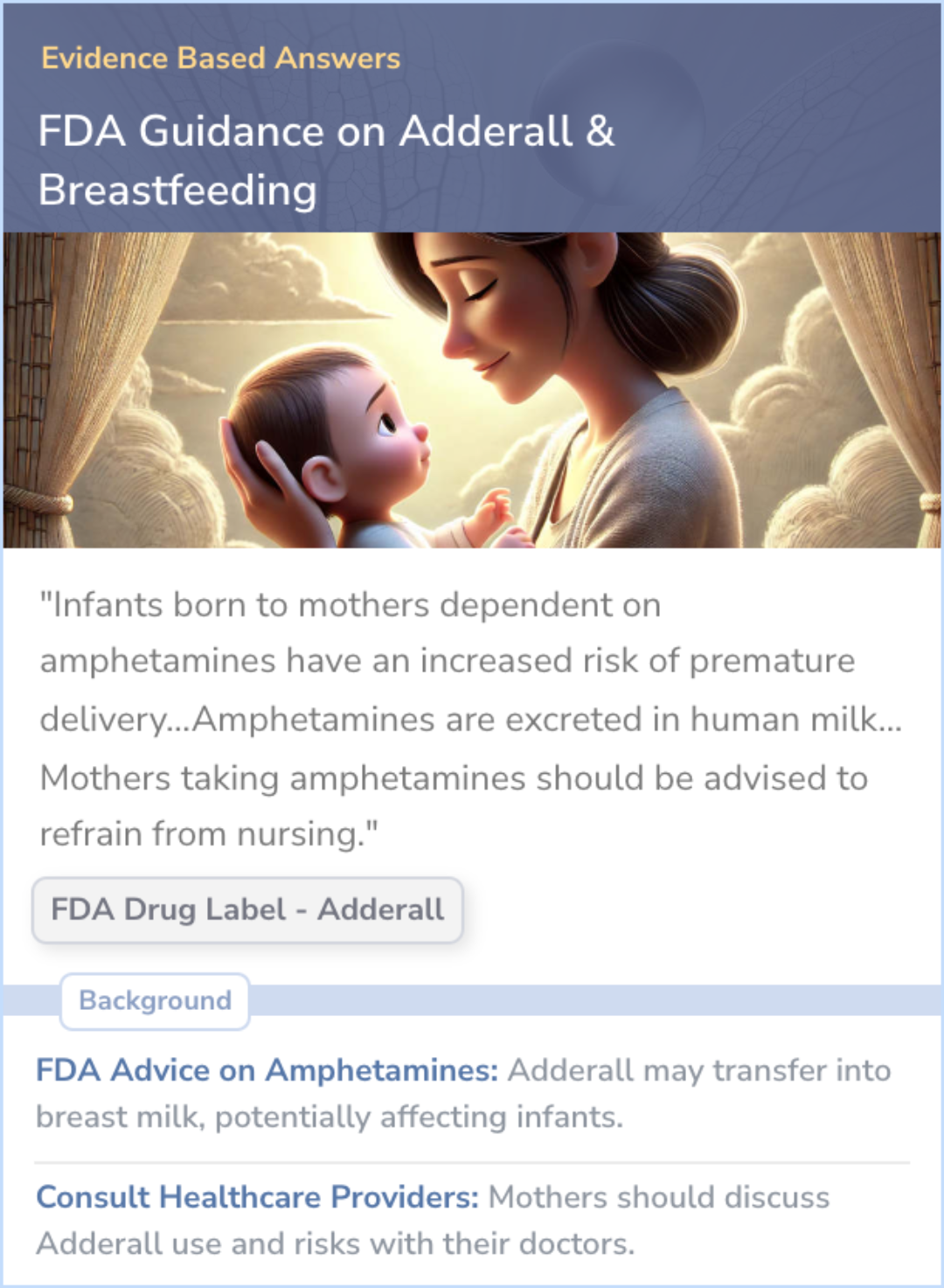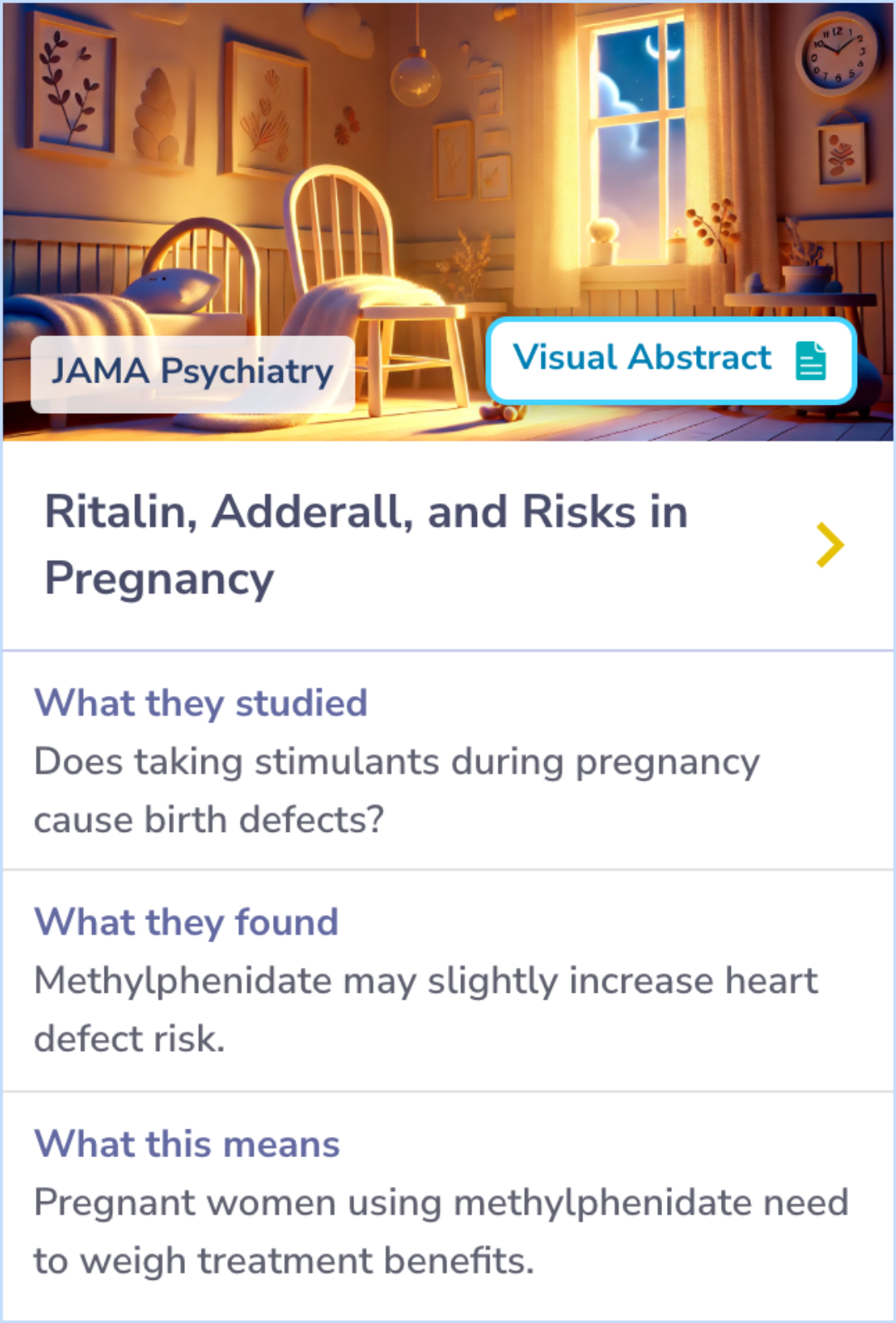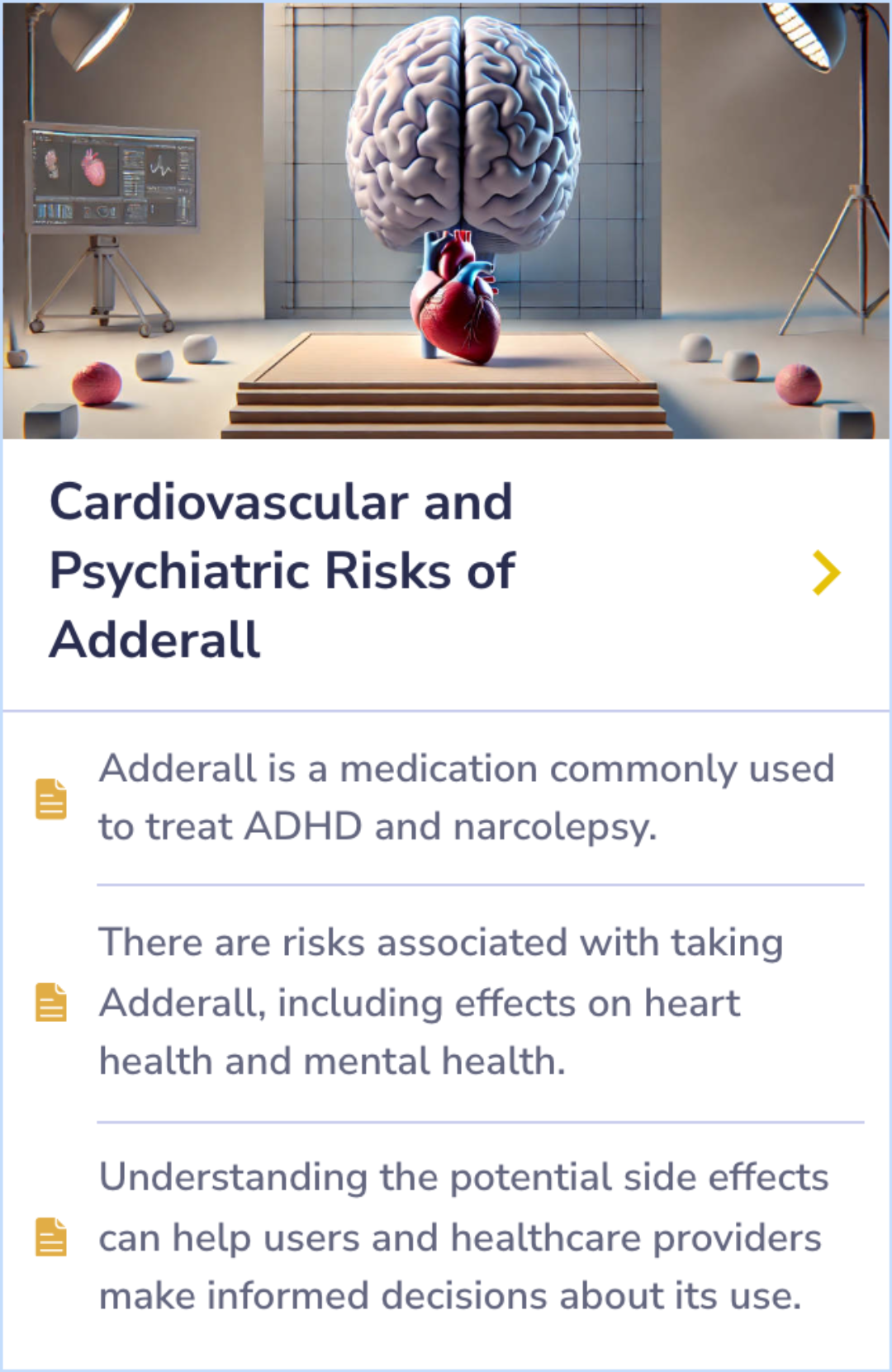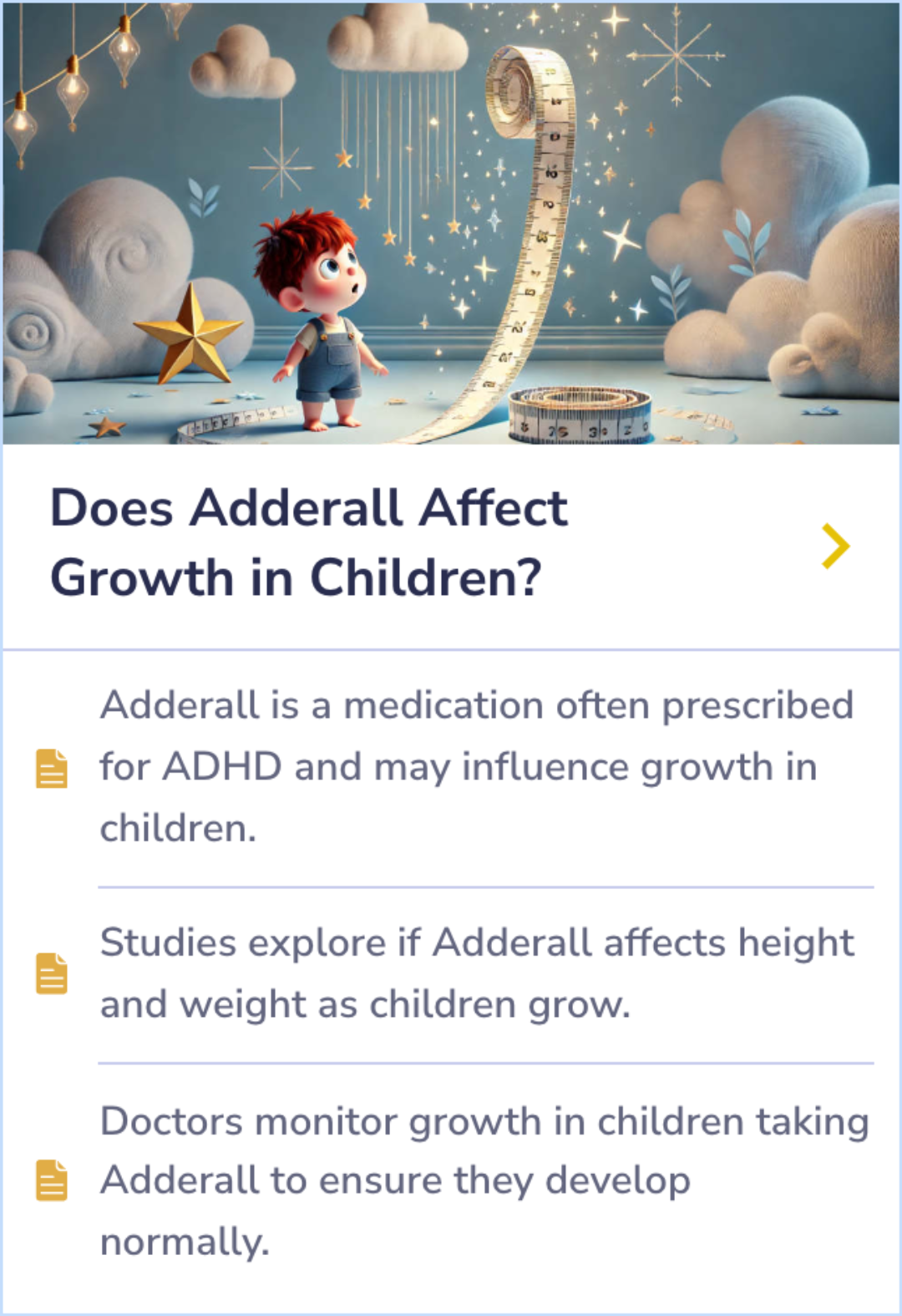Adderall
Evidence Based Answers
What does the FDA say about Adderall and Breastfeeding?
The FDA advises against breastfeeding while on Adderall due to amphetamine transfer to breast milk, affecting infants. Patients should consult healthcare providers for safe usage and refer to Medication Guides for potential risks.
Published: November 13, 2024
Click to explore a section:

Adderall may pass into breast milk; consult healthcare providers about safety.
FDA Drug LabelAdderall and Nursing
The FDA-approved label states that infants born to mothers who are dependent on amphetamines face risks such as premature delivery and low birth weight. Additionally, these infants may experience withdrawal symptoms like agitation and significant lassitude.
Amphetamines, including Adderall, are excreted in human milk, and mothers taking amphetamines are advised not to nurse their babies.
Amphetamines, including Adderall, are excreted in human milk, and mothers taking amphetamines are advised not to nurse their babies.
"Infants born to mothers dependent on amphetamines have an increased risk of premature delivery and low birth weight. Also, these infants may experience symptoms of withdrawal as demonstrated by dysphoria, including agitation, and significant lassitude. Amphetamines are excreted in human milk. Mothers taking amphetamines should be advised to refrain from nursing. "
Source:FDA Drug Label - AdderallFDA's Guidance on Adderall and Breastfeeding
The FDA advises against breastfeeding while taking amphetamines, such as Adderall, because the drug can be passed into breast milk. This could lead to exposure for nursing infants.
Mothers should discuss their options with healthcare providers to make informed choices about using Adderall while breastfeeding.
Mothers should discuss their options with healthcare providers to make informed choices about using Adderall while breastfeeding.
“
Source Quotes:
Amphetamines are excreted in human milk. Mothers taking amphetamines should be advised to refrain from nursing.
Do not breastfeed while taking dextroamphetamine and amphetamine.
Discussing Adderall Use with Healthcare Providers
Patients taking Adderall who are pregnant or breastfeeding should speak with their healthcare providers to discuss potential risks and find safe solutions for both mother and infant.
Open conversations help mothers understand and weigh potential risks and benefits related to Adderall use.
Open conversations help mothers understand and weigh potential risks and benefits related to Adderall use.
“
Source Quotes:
Tell your doctor if you are pregnant, plan to become pregnant, or are breastfeeding. If you become pregnant while taking dextroamphetamine and amphetamine, call your doctor.
Amphetamines in Breast Milk: Risks and Considerations
Amphetamines, such as Adderall, can be found in breast milk, potentially exposing infants to the drug. The specific effects depend on the level and duration of exposure.
Careful discussions between mothers and healthcare providers are needed to fully understand these potential risks.
Careful discussions between mothers and healthcare providers are needed to fully understand these potential risks.
Information for Breastfeeding Patients Using Adderall
Patients prescribed Adderall receive Medication Guides that outline safety considerations, including breastfeeding-related risks. These guides are designed to help patients understand potential impacts of amphetamine exposure during breastfeeding.
Healthcare providers play a key role in guiding and monitoring any potential health concerns for both mother and infant.
Healthcare providers play a key role in guiding and monitoring any potential health concerns for both mother and infant.
“
Source Quotes:
Your doctor or pharmacist will give you the manufacturer's patient information sheet (Medication Guide) when you begin treatment with dextroamphetamine and amphetamine and each time you get more medication.
Key Takeaways
Conclusions
mThe FDA advises against breastfeeding while on Adderall, as amphetamines can transfer into breast milk, posing risks for infants. It is important for mothers on Adderall to consult with healthcare providers to navigate the challenges and find safe alternatives.
Healthcare providers cain offer guidance in weighing the risks and benefits, ensuring an informed choice regarding Adderall use during breastfeeding.
Healthcare providers cain offer guidance in weighing the risks and benefits, ensuring an informed choice regarding Adderall use during breastfeeding.

Evidence Summary
Stimulant Use During Pregnancy and Birth Defect Risks
Stimulant use during pregnancy is becoming more common, raising questions about its effects on fetal development. This study explores whether methylphenidate and amphetamines, taken early in pregnancy, are linked to birth defects.
The findings show a slight increase in heart defect risks for infants exposed to methylphenidate but not amphetamines. For major malformations overall, amphetamines show no additional risk, while methylphenidate suggests only a minimal increase.
These results provide a clearer picture of the risks associated with these medications during early pregnancy.
The findings show a slight increase in heart defect risks for infants exposed to methylphenidate but not amphetamines. For major malformations overall, amphetamines show no additional risk, while methylphenidate suggests only a minimal increase.
These results provide a clearer picture of the risks associated with these medications during early pregnancy.
Evidence Summary
Adderall's Heart and Mental Health Risks
Adderall is commonly prescribed for ADHD and narcolepsy but carries potential risks that affect both heart and mental health. This medication can influence cardiovascular functioning, presenting challenges that warrant careful monitoring.
Side effects can also extend to mental health, underscoring the need for awareness around changes in mood or behavior. Engaging with healthcare providers ensures users are fully informed about these considerations.
Side effects can also extend to mental health, underscoring the need for awareness around changes in mood or behavior. Engaging with healthcare providers ensures users are fully informed about these considerations.
Evidence Summary
Adderall's Impact on Children's Growth
Adderall, a common ADHD medication, can influence growth in children by potentially affecting their height and weight. Studies track these changes over time to better understand any developmental impacts.
Doctors often monitor children on Adderall closely to ensure they are growing and developing as expected, taking note of changes in growth patterns during treatment. This helps maintain their overall health while managing ADHD symptoms.
Doctors often monitor children on Adderall closely to ensure they are growing and developing as expected, taking note of changes in growth patterns during treatment. This helps maintain their overall health while managing ADHD symptoms.


